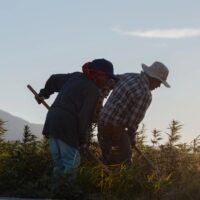
Source: Bloomberg
Every week we track the business, tech and investment trends in CPG, retail, restaurants, agriculture, cooking and health, so you don’t have to. Here are some of this week’s top headlines.
AgFunder has released its 2021 investment report, which has found that startups raised a whopping $26.1 billion in 2020, a 34.5% growth over 2019. Oatly has quietly filed for its IPO, which may value it over $10 billion. Costco has raised its hourly wage to $16 an hour.
Alicia Kennedy makes a strong case for why food tech innovation is useless without justice. The planet needs a radical restructuring of land use, not steaks made in a lab.
Last but not least, USDA data has found that nearly all pandemic bailout funds went to white farmers.
Note From our Team: Our hearts are with our brothers and sisters in Texas. As people struggle with food, water, power and warmth, we hope you will join us in donating money, food and supplies to help the vulnerable in the city. Check out this comprehensive Google Document for a list of ways you can help.
We need your support. Producing our newsletter takes a lot of time and resources, and we need to change our business model to keep it going. To date, we’ve funded our work through our events, sponsorships and consulting, which are all on hold due to the pandemic. If you find our newsletter to be a valuable resource, we hope you will consider making a one time or monthly contribution, so we can keep the newsletter going and free for those who can not afford a subscription fee. Whether it’s $5 or $500 every bit helps and shows us that you value our work. Not able to contribute right now? You can help by sharing our newsletter with friends and colleagues.
Check out our weekly round-up of last week’s top food startup, tech and innovation news below or peruse the full newsletter here.
1. On the Future – From The Desk of Alicia Kennedy
Alicia Kennedy makes a strong case for why food tech innovation is useless without justice. “We know what the planet needs, and it’s the radical restructuring of land use. We know what the people need, which is self-determination around farming for the Global South, as well as for the Black, brown, and Indigenous people upon whose land the United States and other nations settled. Instead, we’re getting steaks made in a lab. Who asked for this?”
2. 2021 AgFunder AgriFoodTech Investment Report – AgFunder
Startups raised $26.1b in 2020, a 15.5% year-over-year increase, which we expect to increase to more than $30b as new 2020 deals come to light. This would represent 34.5% growth over 2019.
3. Oprah-Backed Drink Maker Oatly Files for US IPO – Bloomberg
The company is considering seeking a valuation of around $10b.
4. Costco Raises Its Minimum Wage Above Rivals Like Amazon, Target and Best Buy – CNN
Costco will raise its starting rate for hourly store workers in the United States to $16 an hour. It currently has around 180k US employees, and 90% of them work hourly.
5. USDA Data: Nearly All Pandemic Bailout Funds Went to White Farmers – EWG
White farmers received nearly 97% of the $9.2b provided by October 2020 through CFAP, four times more than the average Black farmer.
6. Food Techs Raised $18.1B in 2020 As Pandemic ‘Fundamentally’ Shifts Consumer Trends – Green Queen
According to data from PitchBook, cell-based agriculture startups raised a record total of $1.6b, $383.2m of which were bagged by cultivated meat firms, marking a 3-fold increase compared to deal values in 2019.
7. Germany: Urban Agriculture Giant Infarm to Reap $250M from Next Fundraising – Sky News
The financing will be completed later this year and is expected to crystallize unicorn status for Infarm.
8. Bio-Fertilizer Startup Anuvia Raises $103M Series C to Expand Its GHG-Reducing Crop Input – AgFunder
TPG ART and Pontifax AgTech led the round. The new funding will go towards increasing its production capacity.
9. Olo Files to Go Public with $100M Offering – Restaurant Dive
The software company posted a 94% increase in revenue during 2020 as customers shifted toward digital ordering channels during the pandemic.
10. Sweetgreen, Momofuku Founders Join $42M Bet on Mini-Marts – Bloomberg
Foxtrot has announced a Series B funding round to expand its chain of upscale convenience stores. Almanac Insights is leading the round.
11. Chinese Grocery App Xingsheng Youxuan Raises $2B in New Funding Round – Reuters
Sequoia Capital China led the round. The three-year-old company delivers online bulk orders to offline grocery stores located inside or near residential communities.
12. Restaurant-Software Provider Toast Prepares for IPO – Wall Street Journal
Toast tapped Goldman Sachs and JPMorgan to underwrite a possible listing later this year. It could also consider other options including a sale or combination with a blank-check company.
13. Where Does Grocery Go Next with Online Fulfillment?
Arthur Chow, VP at S2G Venture’s, explains why Amazon’s early foundation may provide a clue as to why brick-and-mortar will still be needed to build a resilient grocery supply chain.
14. 5 Actions to Reboot Food Retail
We have a responsibility to all stakeholders in our supply chains to pursue deep and substantive change, starting with the social and economic issues that underlie how we grow, make, distribute and sell food. Errol Schweizer, host of The Checkout Radio and former VP of grocery for Whole Foods Market, shares 5 actions food retailers, brands and supply chain stakeholders must take to create a more fair, just and sane food system.
15. How Thrive Market, Once Upon a Farm, Omsom and Tagger Media Are Reimagining Discovery, Acquisition and Loyalty
The unprecedented events of the last year forced food brands to quickly adapt to their customer’s needs and shopping behaviors, while also navigating a rapidly changing grocery retail landscape. Founders share how they grew their businesses through new approaches to customer discovery, acquisition and loyalty.
16. Food & Ag Anti-Racism Resources + Black Food & Farm Businesses to Support
Check out our list of resources to learn about systemic racism in the food and agriculture industries. We also highlight Black food and farm businesses and organizations to support.
Our newsletter is the absolute easiest way to stay on top of the emerging sector, so sign up for it today and never miss the latest food tech and innovation news and trends, Already signed up? Share the love with your friends and colleagues!





